#1
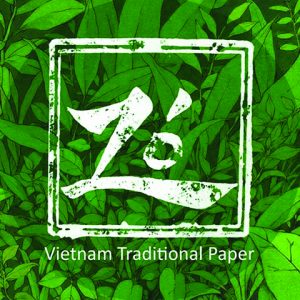
Ever heard of a kind of handmade paper that lasts up to 800 years? The extremely durable Dó paper—made from the bark of the Rhamnoneuron balansae and traditionally produced in Vietnam—is renowned for its durability and resilience, and famous for being the canvas for Vietnamese folk art paintings. However, the meticulous manufacturing process of Dó paper, involving up to 100 steps, is fast becoming obsolete due to the rise in mass-produced goods. Wishing to revitalise this industry, Tran Hong Nhung founded the social enterprise Zo Project , which aims to support the livelihoods of artisans and promote the papermaking trade. Not only does Zo Project collaborate with craftspeople and ecologists to implement eco-friendly papermaking techniques, it also works with artists to create a variety of handicrafts that combine ancient cultural elements with contemporary design. If ever on a visit to Hanoi, check out the Zo Souvenir Shop, nestled in a surprisingly tranquil corner by the train tracks amid the bustling Hoan Kiem area.
#2
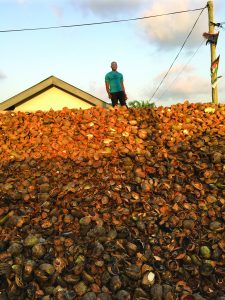
In Ghana, coconuts are more than just a delectable fruit—they also provide an ingenious solution to the country’s hazardous overdependence on charcoal and fi rewood for energy. Sulley Amin founded Zaacoal in 2014 with a vision to manufacture a safe, smoke-free and sustainable alternative to charcoal by using the ubiquitous discarded coconut shells found in most Ghanaian cities. Amin’s innovation concurrently addresses multiple issues facing his home country—not only does Zaacoal have the potential to curb harmful emissions from charcoal and reduce the deforestation involved in fi rewood production, but it further provides an effective management system for coconut waste. Zaacoal caters to both individual households and commercial enterprises with a wide variety of products, including cooking briquettes, quick light charcoal, shisha charcoal and activated charcoal. Amin and his team intend to signifi cantly scale up production in order to meet the growing demand from both the local African and global markets.
#3
Many patients who receive treatment through PICC lines—intravenous tubes inserted in the arm to deliver medications—are advised to wear a bulky and often uncomfortable tube sock to protect the insertion site. Recognising the need for functional and fashionable healthware, Chaitenya Razdan and Susan Jones launched New York-based start-up Care+Wear in 2014 to produce items such as the PICC Line Cover—made from breathable antimicrobial fabric with visibility through a mesh window—as well as specially designed shirts with zipper openings for easy access to chest ports, the implanted device often used in chemotherapy. Care+Wear collaborates with both clinicians and fashion experts to ensure that their products cater to their customers’ medical and lifestyle needs.
#4
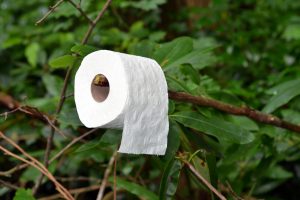
Simon Griffiths, Danny Alexander and Jehan Ratnatunga are more passionate about toilet paper than the average person. Based in Australia, their cheekily named social enterprise Who Gives A Crap is dedicated to transforming the way we think about basic sanitation, one roll at a time. The company was founded in response to the startling lack of access to toilet facilities in developing countries, which affects around 2.4 billion people and causes deadly waterborne illnesses. Who Gives A Crap sells forest-friendly toilet paper made from recycled materials and donates 50 per cent of its proceeds to build toilets in the developing world. The benefits are twofold: to date, the efforts of this social enterprise have resulted in the reduction of nearly 6,000 tonnes of greenhouse gas emissions and improved sanitation for approximately 100,000 people. Who Gives A Crap’s funky yet ethical products can be purchased off their website.
#5
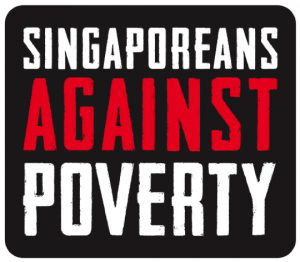
With the towering skyscrapers and glitzy malls that dot the island, the average Singaporean can sometimes be oblivious to the plight of low-income groups who struggle on a daily basis to make ends meet. To this end, Singaporeans Against Poverty , a local campaign under Caritas Singapore, hopes to spark a wider conversation about the invisible urban poor and the vicious cycle of poverty with two simulation initiatives. Respectively called the $5 Challenge and PING!: Poverty Is Not a Game, the former challenges participants to spend no more than 5 Singapore dollars a day on food and transport—the same amount spent by each household member in the country’s bottom ten percentile—while the latter is an online game in which players, cast as underprivileged characters, deal with a variety of difficult life choices faced by the low-income members of society. Through these simulation exercises, Singaporeans Against Poverty exposes the general public to the interconnected dimensions of poverty and unmet medical, social and emotional needs.
#6

ImpacTech is an acceleration and educational programme for early-stage start-ups that harness technology in innovative ways to tackle social issues. Founded in Singapore by Kineret Karin and Yoav Elgrichi, its team of mentors and partners consult and provide collaborative networks for companies looking to acquire funding and development plans. Focusing on start-ups that deal with a variety of social issues—ageing populations, empowering people with disabilities, nutrition and health, education and safer work environments, to name a few— ImpacTech selects companies based on their capacity for sustainable growth and whose leaders prioritise solving social issues affecting relevant communities. Some of its companies include Hapticus, a technology start-up that helps disabled people navigate urban spaces more efficiently; and Youcall, which facilitates multilingual communication by providing translation services for calls.
#7
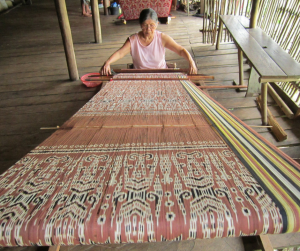
In a pervasive consumerist culture dominated by the mass production of goods, Coopita distinguishes itself as a conduit between local Asian artisans and global consumers by supplying attractive and high-quality goods ranging from handwoven patterned silk stoles to colourful “pinch-striped” teapot sets. Cofounded by Naomi Jacob, Mayur Singh and Isaac Lian, this e-market preserves authentic and rare forms of craftsmanship by offering a carefully curated range of products sourced from underexposed Asian markets. Beyond promoting greater awareness for these small-scale enterprises, the Coopita team values the story and “human connection” behind the unique crafts: in May 2017, they partnered with “Meet the Makers Indonesia” to host their inaugural “Meet the Makers Singapore”, a series of exhibitions, talks and workshops featuring their network of Asian artisans.
#8
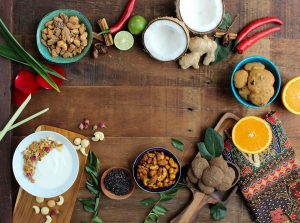
Amy Zheng and her team at Amazin’ Graze aim to steer more people away from unhealthy snacks like greasy chips and buttery cookies, and introduce them to healthier options. Founded in Malaysia and additionally operating out of Singapore and Hong Kong, this start-up locally procures raw fresh ingredients such as nuts, seeds and granola, and combines them into small batches of flavourful blends at S$6.50 per pack. With products including Tom Yom Kaffir Lime Nut Mix, Rose Macadamia Granola and Pulut Hitam Cookies, Amazin’ Graze’s healthy munchies are available at Tangs and Naiise outlets, as well as online.
#9
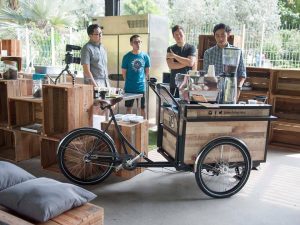
This is not your average coffee cart. Founded by Tony Boatman in 2014 in partnership with Madi Gras, founder of Dapper Coffee and Apostrophe Coffee&Crafts, Bicycle Barista is a “profi t for purpose” social enterprise that not only serves up delicious crafted drinks, but also provides young “coffeepreneurs” with an easy, cost-effective way to start their businesses—through a collaborative network of events, chat sessions and online tutorials. Their bicycle cart model was intentionally chosen because of its minimal carbon footprint and ease of access to different locations. Bicycle Barista currently operates in shared spaces within corporate buildings and small regional areas, but also participates in pop-ups for private or corporate events.
#10
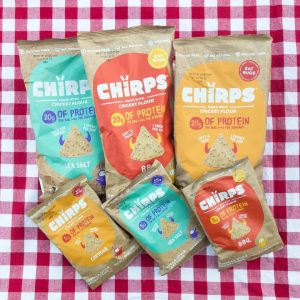
According to the Food and Agriculture Organization of the United Nations (FAO), global production of livestock accounts for 14.5 per cent of anthropogenic greenhouse gas emissions, such as excess methane from land clearance, feed production and animal waste. If you are “bugged” by the environmental strain caused by current consumption practices, why not turn to Chirps , chips made from cricket flour? Crickets require minimal resources for cultivation and are packed with protein and fi bre, making them sustainable and nutritious snacks. Chirps Chips is one product under parent company Six Foods, founded by Harvard alumnae Laura D’Asaro, Rose Wang and Meryl Nato, who aim to normalise entomophagy (the practice of eating insects) to promote alternative food sources. Chirps Chips comes in three different flavours: BBQ, sea salt and cheddar.
Banner image: Photo by Edu Lauton via Unsplash.
Know of more cool people doing cool stuff? Write us at hello@socialspacemag.org to get them featured!




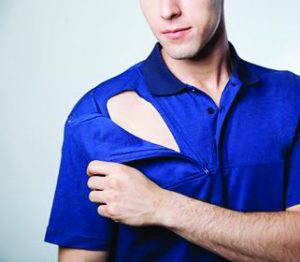
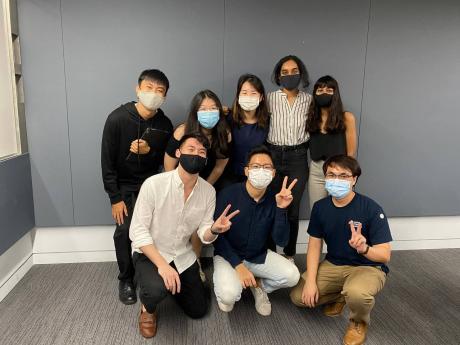

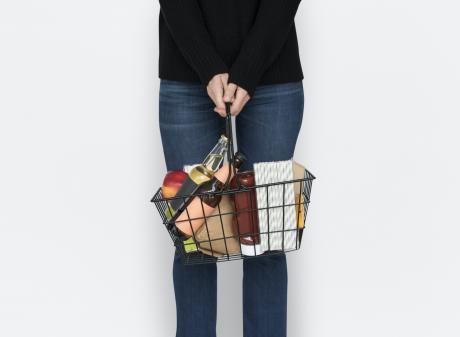
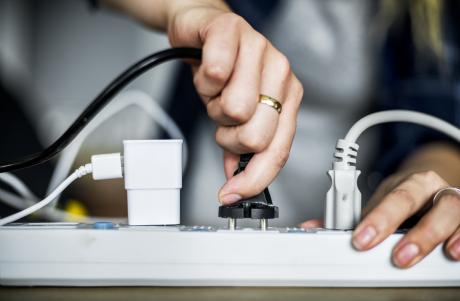
Comments